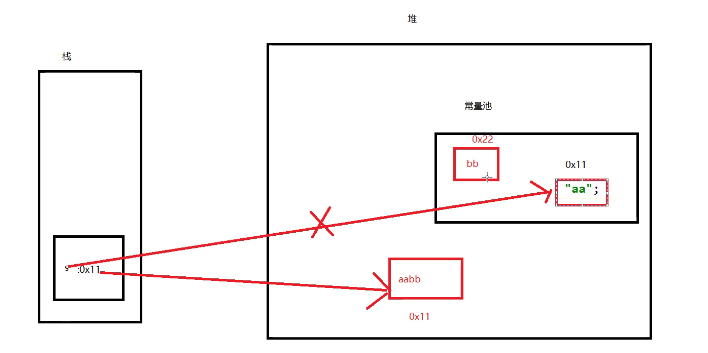String类
String类
- 概述

特点
- 字符串不变:字符串的值在创建后不能被更改。[[值传递和引用传递#String类型|String类引用传递]]
package com.zhou.day0822;
//String类
public class Demo01 {
public static void main(String[] args) {
//只要是引用类型的数据 new出来的都在堆内存中
int a = 10;
//String类型可new可不new 分情况分析
//String s = new String();
//String s = "aa";//
//1.字符串不变:字符串的值在创建后不能被更改。
String s = "狗子";
//一个引用类型变量默认情况下打印的都是内存地址
System.out.println(s);
s = s + "bb";
System.out.println(s);
}
}

- 上图一个创建了三个对象,但是s的地址从始至终都没有变。此即String类的值不可变性!
- 因为String对象是不可变的,所以它们可以被共享。
//1.字符串不变:字符串的值在创建后不能被更改。
String s = "狗子";
//一个引用类型变量默认情况下打印的都是内存地址
System.out.println(s);
//s = s + "bb";
System.out.println(s);
//2.因为String对象是不可变的,所以它们可以被共享
String s1 = "狗子";
System.out.println(s == s1);//true
3. "abc" 等效于 char[] data={ 'a' , 'b' , 'c' } 。
//3. "abc" 等效于 char[] data={ 'a' , 'b' , 'c' } 。
char[] c = {'a','b','c'};
String str = new String(c);
System.out.println(str);
使用步骤

package com.zhou.day0822;
public class Demo03 {
public static void main(String[] args) {
//无参构造
String str = new String();
//通过字符数组构造
char[] c = {'a','b','c'};
String str2 = new String(c);
//通过字节数组构造
byte[] bytes = {97,98,99};
String str3 = new String(bytes);
}
}
常用方法
- 判断功能的方法:
public boolean equals(Object anObject):将此字符串与指定对象进行比较。
public class Demo04 {
public static void main(String[] args) {
String s1 = "Hello";
String s2 = "Hello";
String s3 = "HEllo";
String s4 = new String("Hello");
System.out.println(s1 == s2);
//只要内存地址一样 两个变量内容肯定一样 反过来不成立
System.out.println(s1.equals(s2));
String s5 = "He";
s5 = s5+"llo";
System.out.println(s5.equals(s1));//true
System.out.println(s5 == s1);//false
}
}
public boolean equalsIgnoreCase(String anotherString):将此字符串与指定对象进行比较,忽略大小写。
public class Demo04 {
public static void main(String[] args) {
String s1 = "Hello";
String s2 = "Hello";
String s3 = "HEllo";
System.out.println(s2.equalsIgnoreCase(s3));//true
- 获取功能的方法
public int length();:返回此字符串的长度。public String concat(String str);:将指定的字符串连接到该字符串的末尾。public char charAt(int index);:返回指定索引处的char值。public int indexOf(String str);:返回指定子字符串第一次出现在该字符串内的索引。public String substring(int beginIndex);:返回一个子字符串,从beginindex开始截取字符串到字符串结尾。public String substring(int brginIndex,int endIndex);:返回一个子字符串,从beginindex到endindex截取字符串。含beginindex,不含endindex。(左闭右开)
- 方法演示,代码如下:
package com.zhou.day0822;
public class Demo05 {
public static void main(String[] args) {
//1.获取字符串的字符个数
String s = "helloworldhello";
System.out.println(s.length());
//2.将指定的字符串连接到该字符串的末尾。
s = s.concat("666");
System.out.println(s);//helloworldhello666
//3.返回指定索引处的char值
char c = s.charAt(5);
System.out.println(c);
//4.返回指定子字符串第一次出现在该字符串内的索引。
int i = s.indexOf("hello");
System.out.println(i);
//5.返回一个子字符串,从beginindex开始截取字符串到字符串结尾。
String str = "yedemingmingshu";
System.out.println(str.substring(4));
//6.返回一个子字符串,从beginindex到endindex截取字符串。含beginindex,不含endindex。(左闭右开)
String str1 = "jishizaixiaodefanyenengyuanhang";
System.out.println(str1.substring(2,7));
}
}
- 转换功能的方法
public char[] toCharArray();:将此字符串转换为新的字符数组。public byte[] getBytes();:适用平台默认字符集将该String编码转换为新的字节数组。public String replace(CharSequence target,CharSequence replacement);:将于target匹配的字符串使用replacement字符串替换。
- 方法演示,代码如下:
public class Demo06 {
public static void main(String[] args) {
//1.将此字符串转换为新的字符数组。
String str = "abcabc";
char[] c = str.toCharArray();
for (int i = 0;i<c.length;i++) {
System.out.println(c[i]);
}
//2.适用平台默认字符集将该String编码转换为新的字节数组。
byte[] b = str.getBytes();
for (int i = 0;i<b.length;i++) {
System.out.println(b[i]);
}
//3.将于target匹配的字符串使用replacement字符串替换。
String s = str.replace("bc","aa");
System.out.println(s);
}
}
- 分割功能的方法
public String[] split(String regex);:将此字符串按照给定的regex(规则)拆分为字符串数组。
- 方法演示,代码如下:
package com.zhou.day0822;
public class Demo07 {
//1.分割功能的方法
public static void main(String[] args) {
String s = "aa-bb-cc-dd";
String[] str = s.split("-");
for (int i = 0;i<str.length;i++) {
System.out.println(str[i]);
}
}
}


 浙公网安备 33010602011771号
浙公网安备 33010602011771号